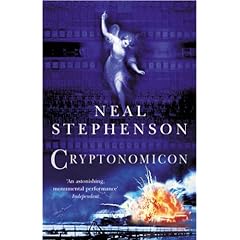 I have just finished reading Neal Stephenson's Cryptonomicon (see at Amazon.co.uk and Amazon.com), recommended to me by a couple of people, to whom I think I'm grateful. This is, without doubt one of the most remarkable books I've ever read. It's almost as if an author has set out to break all the traditional rules for a successful novel, and has made it succeed by sheer willpower. There something hypnotic about this book's attractiveness.
I have just finished reading Neal Stephenson's Cryptonomicon (see at Amazon.co.uk and Amazon.com), recommended to me by a couple of people, to whom I think I'm grateful. This is, without doubt one of the most remarkable books I've ever read. It's almost as if an author has set out to break all the traditional rules for a successful novel, and has made it succeed by sheer willpower. There something hypnotic about this book's attractiveness.Aside from its absurd length, there were bits that really irritated. The fictional island race that were a cross between Western islanders and Manx, for instance, were initially baffling, then an over-played joke. Various sections dragged. Whenever he transcribed an email they seemed intentionally boring. I admit to skipping through a few pages occasionally when the plot obviously wasn't going anywhere. And the ending was a let down - the whole thing had been so complex, so conspiratorial and so engaging that the end goal seemed to underplay the effort of reading it.
Yet despite all this it has to be one of the best novels I've read. It helps, I suspects, that many of the principle characters are geeks (and I found the sections centred on them much more interesting than the gung-ho war sections). It's worth trying - and giving it time to get going, because something of this complexity is impossible to really get into in the first few pages. Remarkable.
I'm now gathering enough wind to take on Stephenson's even bigger Baroque Cycle.

The Baroque cycle is the same, but more so... there are some good geek jokes in it though (I think around 800 pages in)
ReplyDeleteNot got that far yet, but enjoying it so far. I read up a lot on Newton when I wrote Light Years, so it's interesting seeing this fictional version of him and the early Royal Society. I just love their random interest in, well, everything (if not the tendency to cut dogs up).
ReplyDelete